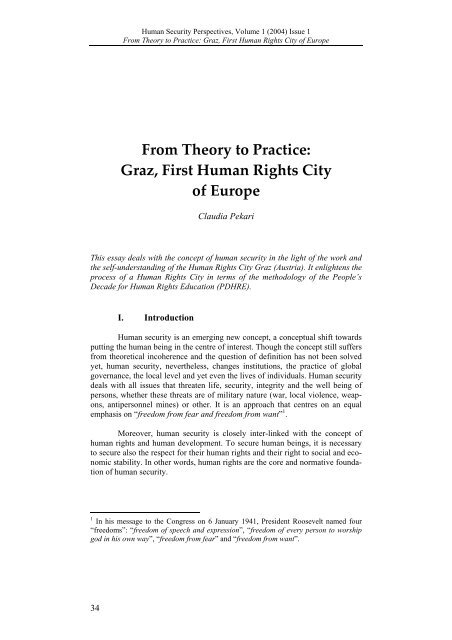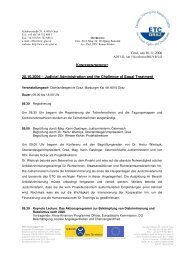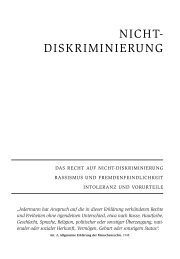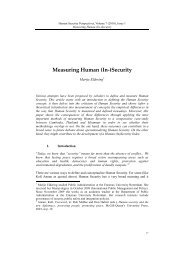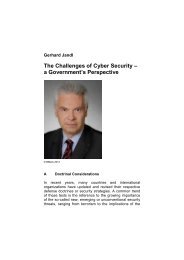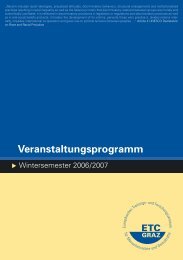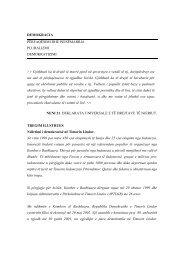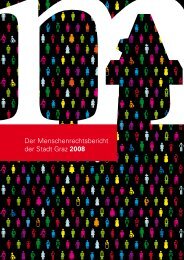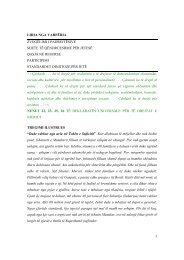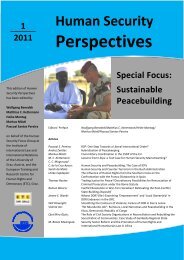Title Of The Essay - ETC Graz
Title Of The Essay - ETC Graz
Title Of The Essay - ETC Graz
Create successful ePaper yourself
Turn your PDF publications into a flip-book with our unique Google optimized e-Paper software.
Human Security Perspectives, Volume 1 (2004) Issue 1<br />
From <strong>The</strong>ory to Practice: <strong>Graz</strong>, First Human Rights City of Europe<br />
From <strong>The</strong>ory to Practice:<br />
<strong>Graz</strong>, First Human Rights City<br />
of Europe<br />
Claudia Pekari<br />
This essay deals with the concept of human security in the light of the work and<br />
the self-understanding of the Human Rights City <strong>Graz</strong> (Austria). It enlightens the<br />
process of a Human Rights City in terms of the methodology of the People’s<br />
Decade for Human Rights Education (PDHRE).<br />
I. Introduction<br />
Human security is an emerging new concept, a conceptual shift towards<br />
putting the human being in the centre of interest. Though the concept still suffers<br />
from theoretical incoherence and the question of definition has not been solved<br />
yet, human security, nevertheless, changes institutions, the practice of global<br />
governance, the local level and yet even the lives of individuals. Human security<br />
deals with all issues that threaten life, security, integrity and the well being of<br />
persons, whether these threats are of military nature (war, local violence, weapons,<br />
antipersonnel mines) or other. It is an approach that centres on an equal<br />
emphasis on “freedom from fear and freedom from want” 1 .<br />
Moreover, human security is closely inter-linked with the concept of<br />
human rights and human development. To secure human beings, it is necessary<br />
to secure also the respect for their human rights and their right to social and economic<br />
stability. In other words, human rights are the core and normative foundation<br />
of human security.<br />
1 In his message to the Congress on 6 January 1941, President Roosevelt named four<br />
“freedoms”: “freedom of speech and expression”, “freedom of every person to worship<br />
god in his own way”, “freedom from fear” and “freedom from want”.<br />
34
Human Security Perspectives, Volume 1 (2004) Issue 1<br />
From <strong>The</strong>ory to Practice: <strong>Graz</strong>, First Human Rights City of Europe<br />
This article deals in particular with <strong>Graz</strong> as the only Western Human<br />
Rights City out of all the existing ones 2 . It raises basic and fundamental questions<br />
about the entitlement and the self understanding of <strong>Graz</strong> being a Human<br />
Rights City. It tries to give an answer to the question: Why did <strong>Graz</strong> - a well<br />
developed Western city - explicitly declare itself as Human Rights City and thus<br />
imposing the task on itself to question human rights related issues in the town<br />
and consequently exposing hidden problems 3 ?<br />
In the following, the necessity of strengthening the citizens’ equal and<br />
informed participation in the decision-making and the problem-solving process,<br />
in addition to the necessity to enable women and men to become “agents of<br />
change” will be highlighted. In essence, the article aims to prove on the example<br />
of <strong>Graz</strong> the necessity of each town, each community regardless its welfare, its<br />
development, its societal situation, to motivate its citizens and to get them involved<br />
in the search of solutions of their human rights problems. <strong>The</strong> importance<br />
for each town to energise and to motivate its community to engage in a life long,<br />
never-ending process of learning about and living human right means, in short,<br />
to know, to claim and to secure the right to be human! And this is where the<br />
concept of the Human Rights Cities comes into play.<br />
II. <strong>The</strong> concept of Human Rights Cities<br />
<strong>The</strong> Human Rights Cities initiative has been developed by the People's<br />
Decade for Human Rights Education (PDHRE) 4 . It is a historic initiative in<br />
which a whole community examines traditional beliefs, collective memories and<br />
aspirations in relation to the Universal Declaration of Human Rights. <strong>The</strong> whole<br />
process is based on the belief that the citizens of all countries must be aware of<br />
their rights and the implications of their government’s obligations under international<br />
and regional human rights law - in order to make these national and international<br />
human rights standards effective. <strong>The</strong> main idea is to use “the city and<br />
its institutions as a complex social, economic and political entity to become a<br />
2 <strong>The</strong> Human Rights Cities worldwide are: Dinajpur (Bangladesh), Elfasher City (Sudan)<br />
<strong>Graz</strong> (Austria), Kati (Mali), Nagpur (India), Rosario (Argentina), <strong>The</strong> People of Abra<br />
(Philippines), Thies (Senegal). Edmonton (Canada) will be the second Western Human<br />
Rights City; Lyon (France) is considering to become a Human Rights City.<br />
3 It is necessary that even well developed and democratic societies must learn to “understand<br />
human rights and the obligations and the responsibilities that they entail in a holistic<br />
and comprehensive way. <strong>The</strong>y must learn to monitor and enforce human rights<br />
effectively and efficiently.” See: People’s Decade for Human Rights Education<br />
(PDHRE), Developing Sustainable Human Rights Cities<br />
All websites occurring in this essay<br />
were last checked on 1 February 2004.<br />
4 PDHRE is a non-profit NGO (founded in 1989 and based in New York), which puts its<br />
emphasis on promoting, enhancing and providing learning about human rights as relevant<br />
to people’s daily lives at all levels of society. See online:<br />
.<br />
35
Human Security Perspectives, Volume 1 (2004) Issue 1<br />
From <strong>The</strong>ory to Practice: <strong>Graz</strong>, First Human Rights City of Europe<br />
model for citizen’s participation in their development. … This process leads to<br />
the mapping and analysis of causes of violations and the designing of ways to<br />
achieve the fulfilment of human rights in their city. Appropriate conflict resolution<br />
is an inevitable consequence of the learning process as women and men<br />
work to secure social and economic transformation and the sustainability of<br />
their community as a viable, creative caring society.” 5<br />
In theory the concept implies, among others, the following steps for a<br />
successful implementation: 6<br />
<strong>The</strong> first step is the creation of a steering committee, with representatives<br />
from all sectors of society. Various groups working on different issues,<br />
such as children, culture, development, education, food, migrant<br />
workers, poverty alleviation, refugees, security, women, form the core<br />
of the committee.<br />
In a next step, the members of the steering committee design a plan of<br />
action and develop a common vision for their Human Rights City. Educators<br />
and the media are summoned to work in close collaboration with<br />
the Committee. <strong>The</strong> Steering Committee develops a “training of trainers”<br />
program with, by and for their constituencies, parliamentarians,<br />
municipal workers, law enforcement officers, the judiciary, business<br />
people, teachers, health care providers, social workers and government<br />
officials. This is done in order to make all state and non-state actors understand<br />
and uphold their obligations and commitments to human rights.<br />
<strong>The</strong> third step concerns the citizens themselves. <strong>The</strong>y play a vital part in<br />
human rights advocacy in the community - by becoming mentors, monitors,<br />
documenters and advocates. Additionally, the citizens are encouraged<br />
to participate actively in the community and city hall meetings,<br />
street theatre and informal community discussions.<br />
In a fourth and last step monitoring and documenting leads to the development<br />
of immediate and long-term plans for the city. During the whole<br />
process participants examine local and national laws and policies. This<br />
is done to ensure that they are in conformity with the human rights<br />
framework.<br />
All together, these steps shall lead to the building of communities which<br />
honour, respect and implement international human rights instruments. <strong>The</strong>y aim<br />
to build a commitment between governments and local authorities, law enforcement<br />
agencies, the judiciary, regulators and community leaders. Thus implementing<br />
and enforcing civil, cultural, economic, political and social human rights for<br />
every woman, man, youth and child.<br />
5<br />
PDHRE, <strong>The</strong> Concept of the Human Rights Cities: What Does it Mean to Be a Human<br />
Rights City?<br />
.<br />
6<br />
PDHRE, <strong>The</strong> Concept of the Human Rights Cities: What Does it Mean to Be a Human<br />
Rights City?<br />
36
Human Security Perspectives, Volume 1 (2004) Issue 1<br />
From <strong>The</strong>ory to Practice: <strong>Graz</strong>, First Human Rights City of Europe<br />
II. <strong>The</strong> process of <strong>Graz</strong> itself<br />
How did it all begin? In June 2000, the European Training and Research<br />
Centre for Human Rights and Democracy (<strong>ETC</strong>) held an international seminar<br />
on “Human Security and Human Rights Education” on behalf of the Austrian<br />
Foreign Ministry and invited the Executive Director of PDHRE, Shulamit<br />
Koenig 7 , who then launched the idea of <strong>Graz</strong> becoming a Human Rights City.<br />
After a preparation process 8 , the Austrian Foreign Minister, Benita Ferrero-Waldner,<br />
proclaimed in her speech at the 55 th session of the General Assembly<br />
of the United Nations (the “Millenium Assembly of the United Nation”)<br />
on 15 September 2000, that <strong>Graz</strong> was going to become the first European Human<br />
Rights City. She pointed out how important it was that all citizens, in particular<br />
all person in positions of leadership, have to respect human rights standards<br />
in their decision-making.<br />
On the 8 th of February 2001 the City Council of <strong>Graz</strong> took an unanimous<br />
decision to declare <strong>Graz</strong> a Human Rights City and to commit itself to base all its<br />
decisions and acts firmly on the basis of human rights. This commitment is currently<br />
being implemented and is leading to the realisation of “<strong>Graz</strong> – First European<br />
Human Rights City”.<br />
Charged with the task of coordinating the process of implementation of<br />
the human rights city model, the <strong>ETC</strong> 9 established a steering committee, representing<br />
NGOs, universities, religious communities, representatives of the civil<br />
society and government institutions. <strong>The</strong> duty of this steering committee was to<br />
identify local issues and develop a strategy for action on human rights issues in<br />
<strong>Graz</strong>. In spring 2001, three working groups were created which addressed civil<br />
and political, social and economic and cultural rights. Overseeing these working<br />
groups, a consortium of community leaders from various organizations 10 was set<br />
up.<br />
7<br />
Shulamit König is the Executive Director and founder of the Organizing Committee of<br />
the People's Decade of Human Rights Education. She spearheaded a worldwide human<br />
rights education advocacy and implementation campaign and the promotion of an implementation<br />
strategy -- a Decade of Human Rights Education -- with the UN Human<br />
Rights Centre, the UN Commission on Human Rights, and at the Vienna Conference. On<br />
the 10 th December 2003 she was awarded the prestigious human rights education price of<br />
the United Nations.<br />
8<br />
In particular contacts between Walther Lichem, Head of the Department on International<br />
Organizations in the Austrian Foreign Ministry, and the former Mayor of <strong>Graz</strong>,<br />
Alfred Stingl, were established.<br />
9<br />
Namely, Wolfgang Benedek (Director of the <strong>ETC</strong>) and Eva Schöfer (Project collaborator).<br />
10<br />
<strong>The</strong> outcome of this evaluation was published in: Schöfer, Eva, <strong>Graz</strong> – Erste Menschenrechtsstadt<br />
Europas – Eine Bestandsaufnahme, <strong>Graz</strong>, Mai 2002<br />
.<br />
37
Human Security Perspectives, Volume 1 (2004) Issue 1<br />
From <strong>The</strong>ory to Practice: <strong>Graz</strong>, First Human Rights City of Europe<br />
After identifying, during 2001, six areas of concern, namely women,<br />
children and youth, persons with disabilities, migrants, elderly and socially disadvantaged<br />
people, a discussion about the oncoming action strategy was started<br />
in 2002 and an action plan 11 was presented to city representatives, local groups<br />
and community leaders. <strong>The</strong> plan envisaged various measures for all target<br />
groups as well as measures for each of the six defined groups. Recommended<br />
measures for all target groups were, for example, a brochure of existing human<br />
rights advisory services in <strong>Graz</strong>, a mobile meeting-platform, district mediation,<br />
the creation of a human rights city forum as well as the creation of an antidiscrimination<br />
authority (which is now called ombudsman-institution for human<br />
rights and against discrimination).<br />
For the target group of women, for example, a meeting platform for migrant<br />
mothers and teachers was planned as well as the assessment of all communal<br />
decisions, laws, etc. to verify their compatibility with human rights, their<br />
gender-specific effects, whether discriminations based on gender take place (including<br />
the thorough use of gender adequate language). <strong>The</strong> creation and/or<br />
upgrading of public space for leisure activities and sport for children and the<br />
youth was envisioned. For disabled persons, the enhanced adaptations of public<br />
residential buildings and spaces as well as incentives for the adaptation of private<br />
residential buildings to the needs of physically disabled persons were figured<br />
out.<br />
Quite a number of measures were prepared for migrants, such as the<br />
translation of information materials available in public offices, intercultural<br />
training modules for official employees in administration, executive bodies,<br />
judges in training, doctors and medical personnel and the creation of meeting<br />
platforms for migrants and Austrians. Additionally in a long term perspective a<br />
town councillor for integration issues shall be implemented and also the political<br />
participation of migrants shall be fostered. Finally, for the group of elderly people<br />
the creation of meeting platforms for senior citizens and youth and the development<br />
of new information methods - “Information comes to the citizen” -<br />
was outlined as well as the enlargement of existing methods of quality control to<br />
encompass all care facilities.<br />
II. Conclusions - outlook<br />
<strong>The</strong> implementation phase of the action plan is in progress. Due to some<br />
political and budgetary changes within the municipality the realisation of many<br />
of the actions suggested in the action plan are delayed and have not been implemented<br />
yet.<br />
But, nevertheless, quite a lot of things have happened in the meantime,<br />
such as a human rights training programme for the collaborators of the city ad-<br />
11 Schöfer, Eva, <strong>Graz</strong> – Erste Menschenrechtsstadt Europas – Eine Bestandsaufnahme.<br />
38
Human Security Perspectives, Volume 1 (2004) Issue 1<br />
From <strong>The</strong>ory to Practice: <strong>Graz</strong>, First Human Rights City of Europe<br />
ministration as well as for teachers of secondary schools. Additionally, a manual<br />
on human rights education “Understanding Human Rights” has been elaborated<br />
by the <strong>ETC</strong> on behalf of the Foreign Ministry. Furthermore, a series of panel<br />
discussions on so called “hot topics” in context of the project “culture of human<br />
rights” have been launched. <strong>The</strong>se hot topics include human rights issues of<br />
particular relevance in <strong>Graz</strong> like the situation of the elderly, religious and human<br />
rights, media and minorities and the equality of woman. Also a human rights<br />
advisory brochure has been published compromising all information centres of<br />
<strong>Graz</strong>.<br />
A concept of an ombudsman-institution for human rights and against<br />
discrimination has been drafted and will hopefully be implemented within the<br />
year of 2004. Also in 2004 the establishment of a human rights forum which will<br />
address specific problems by using monitoring, evaluating and other tactics is<br />
planned as well as the realisation of a district mediation which the specific task<br />
to intervene in cases of misunderstanding and disputes and which shall contribute<br />
to a better understanding within the population.<br />
<strong>Graz</strong> is not only planning to eventually sign the European Charta for the<br />
Safeguarding of Human Rights in the City, but will also realize the actions suggested<br />
in the action plan. Together with profound city marketing, this should<br />
lead to an increased awareness and a better understanding of <strong>Graz</strong> as a Human<br />
Rights City within the population. As there is a vital need to understand how<br />
civil society can play a pivotal role in promoting and protecting human rights –<br />
all in the sense of “<strong>Graz</strong> – a town of humanity, a town in process”.<br />
39


